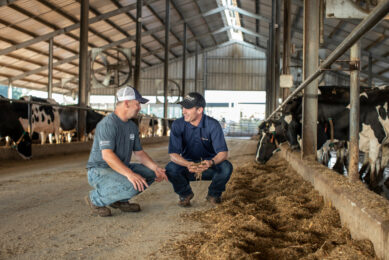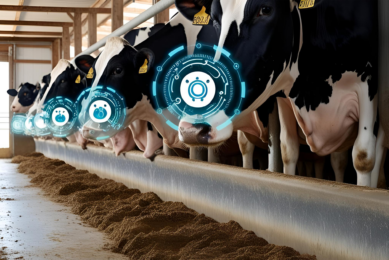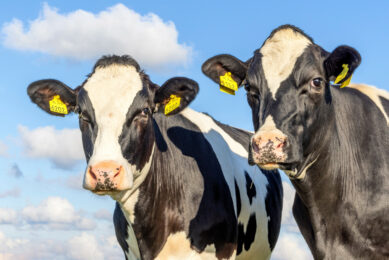Sustainability can equal profitability

Economic, environmental and social sustainability — an opportunity for livestock farmers to manage and reduce resource use to maintain long-term profitability.
Now, more than ever, we are being asked to produce quality, traceable food in a way that has a minimal impact on the environment. Farmers, consumers and other livestock stakeholders are increasingly in need of more information about the environmental performance and sustainability of livestock supply chains. With the ever-growing global population, this is a pivotal time for the agricultural industry, with several challenges to overcome:
- To produce food for a growing population in a more sustainable way
- To adapt to changes in the economic, political and natural environment
- To reduce environmental impact and improve production system resilience
Agriculture is under increasing pressure to improve the sustainability of its supply chains, as well as to quantify the impact it has upon the environment. Alltech is committed to supporting the industry in improving the environmental performance of livestock supply chains whilst ensuring their economic and social viability.

Alltech ACE principle
Alltech’s mission is guided by its founding ACE principle, which demands safety and benefits for the animal, consumer and environment. While helping farmers work toward sustainable livestock farming, Alltech focuses on three core areas of sustainability: Environmental, economic and social.
To help livestock farmers become more sustainable, the company believes in jointly developing plans that combine long-term profitability with environmental care. The company’s nutritional supplements improve the health and performance of animals. Their technologies are effectively utilised in dairy cows and beef cattle, poultry, swine, aquaculture, equine and companion animal sectors, addressing lifelong issues that include immunity, digestive health, mineral utilisation, reproduction and bone strength.
Alltech animal health products focus on achieving optimum well-being, and environmental improvements are often an added benefit. This is for 2 reasons:
- A healthy animal is better able to digest its food and, therefore, excretes less undigested resources back into the environment.
- Products like Allzyme SSF enable an animal to make greater use of its feed, in turn minimising the natural resources that would be needed to feed the animal.
Mineral management
Alltech has invested significant resources in developing patented feed ingredient technologies that support their customers’ business goals. One such example is the Bioplex organic trace mineral range. Inorganic trace minerals are poorly absorbed by most species, and producers tend to over-supplement livestock rations to compensate for this inefficiency. Such practices compound inefficiencies, costing the farmer extra and creating pollution in the form of concentrated excreta.
Alltech has proven that organic trace minerals, in the form of Bioplex and Sel-Plex, can be included at significantly lower levels while still improving animal performance. This optimises animal mineral requirements and reduces negative environmental impacts. This innovation is called Total Replacement Technology (TRT). The range of organic trace minerals, is a true ACE solution, thanks to the benefits it provides to the animal, consumer and environment, resulting in a more sustainable approach to livestock mineral management.
Efforts to reduce environmental impact
As agriculture is one of the top five carbon emitters, the industry is facing complex challenges when it comes to global emissions targets — but the sector is in an ideal place to improve its carbon footprint and sustainability. Agriculture is like all other industries in that, if we focus our efforts and technologies toward improving our resource efficiency, then we can reduce our environmental impact. Improvements in feed quality and animal well-being have a direct effect on overall production efficiency. Animals with healthy guts are better able to absorb nutrients, resulting in lower input costs for farmers and less environmental impact through the waste of undigested nutrients. Within the industry reality of ever-tightening margins and rising raw material prices, this brings significant value to farmers who are eager to see better returns on their investments.
Farmers can be environmentally friendly and make more money. Alltech has developed the ‘What If?’ tool which demonstrates to farmers and supply chain managers that improving profitability can go hand-in-hand with reducing the carbon footprint by utilising the resources more efficiently.
The assurance of sustainable on-farm practices is an area of increasing importance to the industry, along with sustainable food production. With growing consumer awareness, there is a rising long-term global trend in consumer demand for traceable, sustainable and environmentally-friendly produce. As a livestock industry, we need to ensure that we harness this opportunity and demonstrate the effective management of supply chain environmental performance from the livestock sector. This will drive improvements in efficiency, leading to a more profitable business and a reduced environmental impact.
|
| Author: Andrew Wynne, Alltech |
Join 13,000+ subscribers
Subscribe to our newsletter to stay updated about all the need-to-know content in the dairy sector, two times a week.


 How can farmers improve sustainability?
How can farmers improve sustainability?







